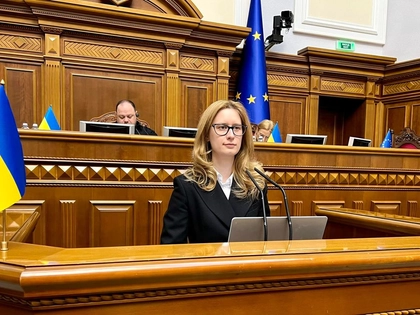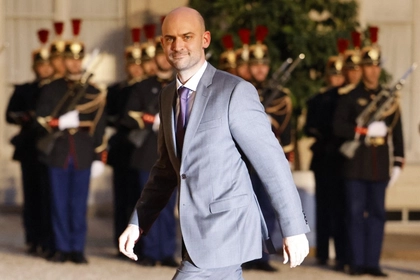The chair of Ukraine’s parliamentary budget committee expects that by Nov. 10, Kyiv will pass next year’s budget – which includes a massive increase for defense.
And Kyiv’s entire income is going for defense, with all the government’s social expenditures being supported by Ukraine’s allies, Budget Committee Chairperson Roksolana Pidlasa said.
JOIN US ON TELEGRAM
Follow our coverage of the war on the @Kyivpost_official.
Ukraine’s parliament, the Verkhovna Rada, passed the first draft budget last week, which included Hr.1.69 trillion ($42.3 billion) for defense – about 21.6 percent of Ukraine’s GDP.
But that figure could increase to Hr.2 trillion ($54.8 billion), Pidlasa said.
Having passed the first draft law, parliament is now considering amendments.
After it “yeas” or “nays” them, a final budget will go to President Volodymyr Zelensky to sign.
There are 1,600 amendments to the budget this year, totaling Hr.12.5 trillion (~$342.1 billion) – versus last year's 1,300 amendments, totaling Hr.4 trillion (~$109.5 billion).
Between the first and second readings of the draft state budget for 2024, Pidlasa spoke to Kyiv Post about the possible revision of Ukraine’s GDP level based on the International Monetary Fund (IMF) forecast, the level of direct budget support expected from partners and international institutions in 2024, and the true needs of the Ukrainian army.
The draft state budget for 2024 contains an optimistic forecast for GDP growth of 5 percent. Meanwhile, the IMF forecasts only 3.2 percent. What will determine whether this figure will ultimately approach 5 percent or 3.2 percent?
![[VIDEOS] North Korean Troops in Russia Confirmed](https://static.kyivpost.com/storage/2024/10/19/a6f6a4c5d74d066019e5812a20c6514f.png?w=420&q=75&f=webp)
[VIDEOS] North Korean Troops in Russia Confirmed
First, the government plans to revise the macroeconomic forecast for the second reading – among other things, with due regard to the IMF forecast.
Secondly, the IMF usually gives a rather conservative forecast. For example, in July, they predicted that in 2023 we would see a 3 percent drop in GDP, and in October they predicted a 2 percent increase in GDP.
Economic recovery is heavily correlated with Russian attacks on the Ukrainian energy system and, consequently, the availability of electricity for production facilities. In 2022, according to the NBU (National Bank of Ukraine), Ukraine lost 1.3 percentage points of GDP due to shelling and power outages.
Given the structure of Ukraine's exports, the stable operation of ports and the grain corridor will be of great importance.
State support for business, for which the draft state budget for 2024 provides a total of almost Hr.31 billion ($848 million), should have a positive impact on GDP growth.
The reconstruction of the country will also support economic growth.
It will be carried out both at public expense and at the expense of international partners, as it will stimulate job creation in many industries and in construction.
The expected inflation rate was reduced from 14.7 percent in 2023 to 10.8 percent in 2024. We know that the government artificially restrains inflation under martial law. When drafting the state budget, did you take into account the scenario that the war may end next year and Ukrainians will face the reality of the situation – a huge surge in prices, etc.
We are seeing a slowdown in inflation in Ukraine, and in response, the NBU is gradually cutting its key policy rate.
Inflation is currently predicted to reach 10.8 percent for the year, but the NBU will revise this forecast downwards.
By the way, in order to smooth out the negative effect of inflation and preserve the real incomes of Ukrainians, the government suggests budgeting for an increase in social standards by two percentage points above the forecasted inflation.
The end of active hostilities will, of course, trigger a lot of “deferred spending” – both businesses and citizens will spend more, and growing demand will lead to higher prices, but there are no grounds to talk about “huge surges” or “hyperinflation.”
In 2023 the Verkhovna Rada adopted the state budget well in advance – on Nov. 4 (according to procedure, the deadline is Nov. 20). Should we expect that this year everything will happen quickly as well?
Yes, we plan to adopt it in the second reading and as a whole by Nov. 10.
The media report that despite the record deficit and expenditures in the 2024 state budget, social standards are expected to rise. Which areas, in your opinion, have been the most balanced?
Expenditures on social and humanitarian issues are currently not covered by state budget revenues.
All the money paid by Ukrainian taxpayers, or borrowed by the government on the domestic market, or received from privatization and other sources – is directed to defense.
In fact, during the full-scale war, the expenditure side of the budget has doubled.
All social expenditures fall into the budget deficit and are covered by our international partners.
Unfortunately, this situation will persist until the end of the war and for some time afterward, until then, defense spending will remain high.
However, the government and parliament need to think about making social assistance more equitable with limited resources – in order to ensure a decent standard of living for those who need it most, rather than spreading it over a large number of recipients.
A good example is the reform of the pay-as-you-go pension system, which, unlike the accumulative system, is not widely discussed.
Its essence should be in raising retirement benefits for the poorest pensioners and cutting the astronomical allowances for former officials.
Is the expected increase in the average monthly salary to Hr.21,852 ($598) in 2024 based on regional averages? In other words, does this mean that all Ukrainians will earn more on average, and not just those in Kyiv and a few other large cities?
There are no official statistics on average salaries by region since the start of the full-scale war.
However, the situation is definitely uneven: the average salary in Kyiv is roughly Hr.20,000 ($548), while in Lutsk it is Hr.15,000 ($411).
At the same time, there is a trend towards salary growth
The state budget deficit is Hr.1.6 trillion ($43.8 billion). You mentioned that the government would negotiate for foreign aid of almost $43 billion ($12-13 billion from the US and €18 billion from the EU). Meanwhile, we have seen news about Biden's request for more than $60 billion for Ukraine and the European Commission's initiative to create a €50 billion ($52.9 billion) fund to help Ukraine. Will this change the overall situation with the deficit, and to what extent?
It is important to understand how much direct budgetary support is envisaged in the overall requests of the European Commission and the US Presidential Administration.
This is €39 billion ($41.3 billion) for four years from the EU and $11.8 billion from the US until September 2024.
With regard to the EU assistance, the budget support will be distributed in equal installments over four years, which will be critically insufficient.
Therefore, it is important to quickly pass the budget in the Verkhovna Rada and start negotiations on funding for 2024.
If Ukraine fails to provide sufficient funding for the state budget for 2024, we will have to cut spending, and the deficit should decrease accordingly.
However, this will mean that businesses will receive less assistance from the state, that the reconstruction projects launched this year will be halted, and many other unpleasant cost-cutting measures will be implemented.
Defense is the largest item of expenditure in the 2024 state budget, with an allocation of Hr.1.69 trillion ($46.3 billion), 21.6 percent of GDP. For example, Hr.48 billion ($1.3 billion) is allocated for the production of drones. In your opinion, will this be enough if next year there is a downward trend in the level of assistance from Ukraine's partners? Will we be able to launch full-scale production of at least one type of equipment at Ukrainian facilities?
Defense spending cannot be sufficient, with the budget request for the Armed Forces alone exceeding several trillion hryvnias.
We do have a full-fledged production of many types of weapons, the problem being that it is not serialized.
That is why the Ministry of Strategic Industries is responsible for launching mass production, and we suggest that funding for this program be allocated at Hr.56 billion ($1.5 billion) in 2024.
The Budget Committee has already redirected funds from the construction of the Holodomor Museum and the production of films and TV series to prosthetics for veterans – Hr.574 million ($15.7 million) and Hr.445 million ($12.2 million), respectively. In addition, the Parliament has increased defense spending by over Hr.300 billion ($8.2 billion).
You can also highlight the text and press Ctrl + Enter






